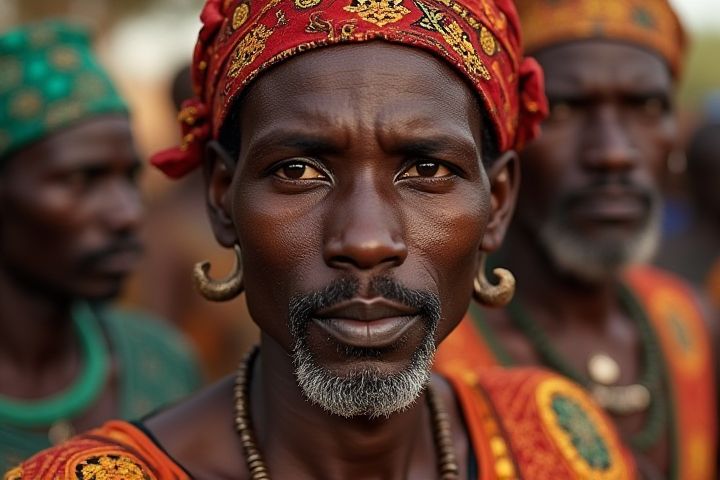
Nigeria boasts a rich tapestry of cultures, with over 250 ethnic groups, each contributing unique traditions, languages, and art forms. The Hausa, Yoruba, and Igbo are the three largest ethnic groups, each with distinct customs, festivals, and dietary practices. Traditional music and dance play a vital role in community celebrations, with genres like Afrobeat and Juju gaining international acclaim. Nigerian cuisine is equally diverse, featuring iconic dishes such as Jollof rice and Egusi soup, which highlight local ingredients and regional flavors. Understanding the intricate interplay of history, art, and social norms is essential to appreciating Nigeria's vibrant cultural landscape.
Diversity of ethnic groups
Nigeria is home to over 250 distinct ethnic groups, each contributing to the nation's rich cultural mosaic. The Hausa, Yoruba, and Igbo are the three largest ethnic groups, reflecting diverse languages, traditions, and beliefs. Festivals, such as the Argungu Fishing Festival and the Osun-Osogbo Festival, showcase this cultural diversity through vibrant celebrations of art, music, and dance. Your understanding of Nigeria's cultural dynamics can deepen by exploring the unique practices and histories associated with each ethnic community.
Rich traditional music and dance
Nigeria's rich cultural heritage is vividly expressed through its traditional music and dance, which are essential components of social and religious ceremonies. The diversity of Nigeria's over 250 ethnic groups contributes to a vibrant tapestry of musical styles, including Afrobeat, Highlife, and Yoruba drumming. Each region boasts unique dance forms that showcase intricate movements designed to tell stories, celebrate life events, or invoke ancestral spirits. Your experience of Nigerian culture is incomplete without immersing yourself in its dynamic rhythms and spirited performances that reflect the communal values and historical narratives of its people.
Prominent Nollywood film industry
The Nollywood film industry, a cornerstone of Nigerian culture, generates over $700 million annually, making it one of the largest film producers in the world. With a prolific output of approximately 2,500 films each year, Nollywood reflects the nation's diverse ethnicities, languages, and traditions, often tackling social issues and everyday life. The industry features a range of genres, from drama to comedy, appealing to a growing global audience and showcasing talented actors and directors. Your engagement with Nollywood not only supports local creatives but also immerses you in the rich tapestry of Nigerian storytelling.
Vibrant fashion and textile designs
Nigeria's culture is characterized by its vibrant fashion and intricate textile designs, reflecting the country's rich heritage and diversity. Traditional attires, such as the Agbada and Ankara, showcase colorful patterns and symbolic meanings that vary across different ethnic groups. Artisan weavers and designers play a crucial role in preserving these textile traditions while infusing modern aesthetics to create contemporary pieces. You can explore a plethora of local markets and fashion shows that celebrate this dynamic fusion of cultural expression and innovative design.
Traditional festivals and celebrations
Nigeria boasts a rich tapestry of culture, vividly expressed through its numerous traditional festivals and celebrations. Each ethnic group, such as the Yoruba, Igbo, and Hausa, showcases unique customs, rituals, and artistic displays during events like the Osun-Osogbo Festival and the Durbar Festival. These vibrant celebrations often feature colorful attire, traditional music, dance performances, and intricate artwork, reflecting the community's history and values. Participating in these festivals offers you an immersive experience of Nigeria's diverse heritage and the profound sense of unity among its people.
Diverse culinary practices and dishes
Nigeria's rich culture is reflected in its diverse culinary practices, varying significantly across its multiple ethnic groups. Traditional dishes such as Jollof rice, Egusi soup, and Suya showcase a blend of indigenous ingredients and cooking techniques, featuring spices that create vibrant flavors. Each region contributes unique specialties, from the savory stews of the south to the spicy dishes of the north, highlighting the country's agricultural bounty. By exploring Nigerian cuisine, you can experience a tapestry of traditions that encapsulate the nation's history and communal values.
Influence of indigenous religions and Christianity
Nigeria's vibrant culture is profoundly shaped by its indigenous religions and Christianity, both of which interweave traditional beliefs and practices with modern spiritual expressions. Indigenous religions in Nigeria often emphasize a strong connection to ancestors, nature, and communal rituals, representing diverse ethnic groups such as the Yoruba, Igbo, and Hausa. Christianity, introduced during the colonial period, has evolved into a dominant faith, fostering a unique blend of traditional African values and biblical teachings within Nigerian society. This cultural fusion manifests in various aspects, including music, dance, festivals, and art, enriching Nigeria's social landscape and reflecting the dynamic interplay between faith and heritage.
Strong oral storytelling tradition
Nigeria boasts a rich tapestry of culture, heavily rooted in a strong oral storytelling tradition. This ancient practice serves as a vital means of preserving history, imparting moral lessons, and entertaining audiences across diverse ethnic groups, including the Yoruba, Igbo, and Hausa. Storytellers, often referred to as griots or "literary tradition bearers," weave intricate narratives that reflect communal values, folklore, and societal norms. Engaging in this oral art form not only fosters community bonds but also ensures the continuity of Nigerian heritage for future generations.
Importance of family and community
Family and community play a crucial role in Nigerian culture, deeply influencing social interactions and individual identities. Extended families often live together, providing a support network that reinforces shared values and traditions. In many Nigerian communities, collective decision-making and communal responsibilities are prioritized, fostering a strong sense of belonging and accountability. Celebrations, religious practices, and festivals are frequently family-centered, enhancing social bonds and cultural continuity.
Rich artistic expressions and crafts
Nigerian culture boasts a vibrant tapestry of artistic expressions, including traditional music, dance, and visual arts, reflecting its diverse ethnic heritage. Renowned for intricate craftsmanship, the country's artisans create striking beadwork, textiles, and pottery that embody cultural significance and skill. Festivals celebrated across various regions showcase this rich artistic legacy, with events featuring elaborate masquerades, storytelling, and live performances. Embracing both traditional and contemporary influences, Nigeria's culture remains dynamic, inviting you to explore its multifaceted artistic landscape.
